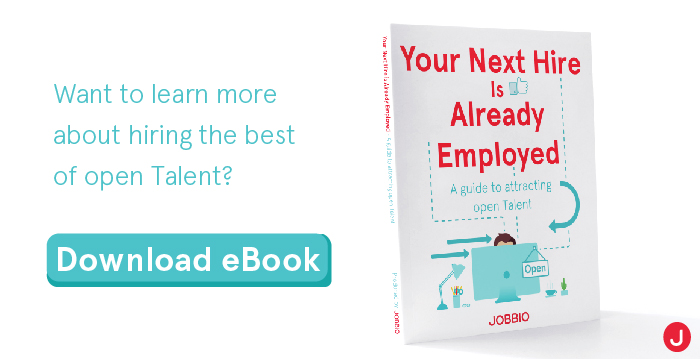 Dee Murphy, Organisational Psychologist and our Expert in Residence at Jobbio, gives her advice on retaining open candidates.
Dee Murphy, Organisational Psychologist and our Expert in Residence at Jobbio, gives her advice on retaining open candidates.
“The biggest risk with hiring passive or open candidates, is that they’re going to be terminal job hoppers, prone to itchy feet and always ‘needing a change’. The fears aren’t completely unfounded – the jobs market has taken dramatic twists and turns over the past decade. The reality is that people don’t have the same loyalty to companies anymore. The average job lifecycle of a Millennial is 2-3 years, after which they up sticks and leave for pastures new.
Employees see themselves as the commodity and the brand they’re interested in building is their own.
Most people are looking to climb the career ladder and will be drawn towards opportunities that offer a sense of promotion – and by this I mean figuratively, not financially. A bump in salary may ignite interest, but people who are good at what they do are usually well paid. Offering people a seat at the leadership table will prove an excellent bargaining tool. Enabling them to oversee operations in their specialist area, to manage a team of people (however small) and to feel they’re really adding value as an expert in their field is one of the most powerful draws that can set you apart from the rest.
Similarly, don’t think you can lure talent in with superficial perks… Yes, everyone enjoys the bells and whistles of free lunches, company swag and the (mostly unused) games’ rooms, zen areas and sleeping pods; so if you’ve got them – make sure you flaunt them. But be warned: these add-ons won’t fool people into thinking they automatically equate to ‘good’ culture. So how do you retain open candidates?

Flat Structure
Our studies show that ‘top down’ management styles aren’t appealing – employees want regular, direct and informal access to everyone in the organisation, regardless of title. Weekly catch ups with long term management, whole team open forum meetings and lunch with the founder or CEO on a work anniversary or birthday – these efforts go a long way to helping employees feel valued. They need to feel a sense of camaraderie with those at the top of the food chain and the chance to feel part of the decision process.
Freedom of Expression and Implementation of Feedback
An organisation that encourages lateral thinking and allows its employees to take risks and make mistakes without fear of retribution is a big win.
If someone feels an improvement could be made to a product, service or office policy they want to be encouraged to voice their concern, they want it taken seriously and they want to see change implemented quickly.
Too much red tape is frustrating and unless you can offer a solid counter argument as to why their idea isn’t an excellent one, employees expect to see results.
Manager Development
It’s equally important that senior staff are continuously developing. Often thrust into positions of power because they’ve been around the longest but with little or no people management skills, a manager who doesn’t understand how their underlings tick is the most common reason for talent turnover. It’s key that organisations encourage the soft skill development of those in leadership roles.
Technical experience doesn’t automatically equate to leadership ability.
The chances are, the longer someone has been in the company, the more they’re going to need the help.

Global Citizenship
Most Millennials and Gen Zs care as much about giving as they do about getting, sometimes even more so. They care about local and international communities and embrace the opportunity to contribute to making the world a better place. If their day-to-day job serves a purpose for the greater good, excellent – but there are other ways to help them feel as though they’re giving back. Volunteering Programmes, paid time off to help with community projects, charity trips abroad and creative in-house fundraising efforts for a worthy cause, are all initiatives that will go a long way to increasing employee satisfaction.
Munificent operational norms such as flexible working schedules, unlimited time off policies, pet friendly offices, generous (and gender neutral) parental leave and competitive salaries are also marks of excellence when it comes to creating a culture of trust, respect and acknowledgment for work-life balance. So, pack up your ping pong table and tone down your primary colours. Nurturing people from the inside out is the true recipe for employee retention, even if they are open candidates.”












